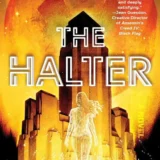CLUBHOUSE: Review: Anathema Magazine issue #11

OBIR: Occasional Biased and Ignorant Reviews reflecting this reader’s opinion.

ANATHEMA, Spec from the Margins – Issue #11, August 2020
An online tri-annual speculative fiction magazine of work by “queer POC / Indigenous / Aboriginal creators” published by Editors Michael Matheson, Andrew Wilmot, and Chinelo Onwualu out of Ontario, Canada.
Cover: Vampire Bar – by Bex Glendining
Editorial: Of Conflated Ideas and Missed Points, or: How Did We Get Here?
– by Andrew Wilmot
Review:
Andrew bluntly states that Cancel Culture is a myth and that the “successful creators, academics, and luminaries” that signed “the now-infamous Harper’s Letter” objecting to Cancel Culture as “a concept that strips us of that most cherished of things: intellectual debate” are, in effect, “the ignorant, and the bigoted, and their defenders, all who’ve chosen to place their trust in obstinance and the status quo.”
Andrew argues that those accused of Cancel Culture are simply tired of “seeing our lives and narratives distorted by others and deciding we want no part in whatever game they’re playing” and are speaking out in the name of free speech and represent a legitimate “response, not a condemnation or erasure.”
This is the single biggest controversy in SF&F literature today. To me it reeks of cold war mentality, if you are not with us, you are against us. Andrew more or less defines the enemy as every author and publisher who is “white, cis, straight, and, more often than not, male.” Actually he is only attacking those who despise SF&F literature reflecting points of view other than the traditional. But it’s easy to get the impression Andrew’s crusading vehemence is directed against every SF&F pro who happens to be white, old, etc. From there it is but a short leap to assume, with few exceptions, that every SF work written before the 2ist century be burned is what is being advocated. Add to this the plunging interest & sales of “old stuff” and many established professionals feel personally threatened and constantly under assault (which, of course, has pretty much been the life-long experience of all minority groups).
Imagine a jousting tournament in which both sets of crusading knights accuse each other of being Nazi’s and you grasp the emotional setting of the controversy. Not much room for debate, only anger.
Frankly, I think everybody needs to settle down and just concentrate on doing their own thing.
Personally, I still love the kind of concept-driven SF I imprinted on when I was a teenager in the 1960s and nothing makes me happier than rereading golden oldies or finding a wonderful pastiche of same. I’m also wildly excited at the growing diversity of the genre and believe we are today living in a fantastic renaissance which has totally rejuvenated what had begun to be threatened by arthritis of the same-old, same-old. These are thrilling times to be a reader.
Granted, some people have gotten carried away by their revisionist enthusiasm. I think it’s a bad idea to ban “old” writers from conventions, just as I think it’s a bad idea for publishers to ban midlist authors and reprints from their catalogues. I believe every fan should have access to the entire corpus of the genre no matter how old. (Sort of possible via internet.) There’s room for everybody, especially at conventions. Celebrate diversity by appealing to diversity, including the old, or the elders, if you will.
However, the real threat against old-style fiction isn’t the upsurge of new-approach fiction as such. Rather, It’s mostly a case of inevitable changes in the situational awareness of the latest generations of readers. Heinlein, Asimov and Clarke aren’t the classics anymore, except to old farts like me. They’re twentieth century junk to many modern fans, basically dead guys not worth reading. Many teenagers have never even heard of said corpses. They want what’s happening now. They want works relevant to them. They want the cool stuff. Appreciating the infrastructure of SF&F literature practically equates to necrophilia as far as they’re concerned. They want nothing to do with it. No amount of lectures or panels or courses on the history of genre literature will change this trend. Publishers know this. That’s why it is so damned hard to find any reprints from the last century in bookstores. Virtually zero demand. No interest.
Still, as long as my generation lives, the old-style occupies a diminishing but nevertheless real market niche. Still possible for the old guard to sell some books, especially long-time established authors with a guaranteed readership base. True, mainstream publishers may no longer be interested, but print-on-demand through indies or self-publication is definitely the best solution currently available. And if more and more conventions don’t want to include you as a program item, just buy a membership and show up to mingle with your fans, throw a room party, promote yourself, keep your “brand” in fannish minds. Mainstream publishers these days insist you do all the promotion anyway, so why not take charge via self-publication and have fun promoting yourself and your work? Your fans will appreciate it.
Granted, much more difficult for newbie authors to go that route, but probably less difficult than trying to get published mainstream. The key is to know for a fact you are not going to make a living writing (statistics are against you), but if you can accept that reality you will still be left with a sense of accomplishment, creativity satisfied, and a lot of fun creating a miniscule fan base and gradually increasing it as time goes on. Providing you stick within your budget of money you can afford to waste, there’s no reason why writing can’t be the best hobby you’ve ever had. Newbies have little prospect of getting rich, but every probability of having fun. That makes writing worthwhile.
Besides, by 2050 most of the twentieth century authors will have disappeared from the radar, with maybe a half dozen occupying an H.G. Wells niche, i.e. fans knowing they really should get around to reading those classics someday because they’re supposed to be important or significant or something, but meanwhile there’s this real cool series written by the latest A.I. which everyone is talking about, etc.
So, essentially I’m telling everyone to lighten up and just get on with seeking the best literature in whatever your sub-genres of interest are within SF&F. Life is too short to waste time attacking each other. More fun to read the good stuff. Even better to write it.
There, I’ve wasted space writing out my take on the controversy. So, apologies to the authors, but my reviews will be correspondingly brief as a result. Some may consider that a virtue, given my idiosyncratic tastes.
Heard, Half-Heard, in the Stillness – by Iona Datt Sharma
Premise:
Ekta is one of India’s first astronauts. She was so looking forward to serving aboard the space station Gangayaan, but now the entire manned program is on hold because of an accident.
Review:
India is a huge, complex nation with more than a billion people. Ekta represents India’s future, but is trapped in the past, having been reduced to a mere family member in an extended family who live according to centuries of tradition. The new bride from America who considers the Indian space program a waste of money better spent on the poor is a particular annoyance. Ekta dreams of walking on Mars. Now she considers herself blessed if she can avoid being scolded by her mother-in-law.
The essential conundrum of big dreams versus conforming to tradition here receives an inventive twist in that an American is criticizing India for being too progressive. Perhaps implying America is falling behind, or deserves to. However, all industrial powers face this problem. I think the point of the story is that America is no longer as unique as many of its citizens believe, that their faith in “exceptionalism” is obsolete. Probably true. This doesn’t solve the world’s problems, though. It just means everybody has the same problems.
Tiger of the New Moon – by Allison Thai
Premise:
Once a month a fearsome tiger eats one of the villagers. Hoi is tired of being beaten by her father, and runs into the jungle to offer herself to the tiger. It never occurred to her the tiger might not want to eat her.
Review:
On one level this comes across as a charming Vietnamese folk tale. On another, it explores the concept of tradition being a form of curse, of culture being a prison preventing personal enlightenment. It’s a call for freedom coming from both Hoi and the tiger. If you don’t stand up for yourself you are cursed forever to be servant or slave to someone else’s will. There’s a clear implication this curse is something every LGBTQ individual lives under and needs to escape from, and that self-realization and rejection of custom and tradition is the key to liberation. Again, something that is probably true. This story perhaps a wake-up call to people not yet quite convinced they need to break away from the curse. That the tiger is a fascinating character lends strength to the call.
Hungry Ghost Marriage (Poem) – by May Chong
Premise:
Is getting married during hungry-ghost month a good idea or no?
Review:
I particularly like the line “Our ancestors would kill us if they weren’t already dead.” Puts added pressure on the need to please and appease, on the need to throw one heck of a spectacular dinner celebration to satisfy. Good thing the hungry-ghosts are all relatives, however distant. Makes it slightly easier to impress. I suppose the point here is that tradition can be exploited purposefully to selfish ends. Reject, or embrace. Either choice can give you the freedom you seek, providing you own it.
We Have Evacuated, Have a Good Day – by Jendayi Brooks-Flemister
Premise:
Now that Grandma is dead, grandpa lives alone in their small brick house in Loris, South Carolina. A category 6 hurricane is about to hit. One of his granddaughters decides to rescue him. She knows it won’t be easy.
Review:
Finally, a story about one of the most common American experiences, trapped by a hurricane. It is rich in detail about what it’s like to be driven to the attic, and then to the roof, the sorts of things one feels and sees. Another common experience is gentrification. In this case the granddaughter is a scholar and expert on the subject, writing a book about how the White man takes away Black heritage and strips it down to the raw brick of urban renewal, both literally and spiritually. Her grandfather, on the other hand, is a no-nonsense one-day-at-a-time fortress of rejection who insists her best bet is to marry a mailman. She dare not tell him she’s been dating another woman. She desperately wants to bond with her grandfather, finally, after a lifetime of being kept at a distance, but knows she can’t. Facing both death and denial at the same time is frustrating. Again, a theme of the limitations of the old ways actively opposing progress in any real sense of the word.
Lest one comes away with the feeling a family life is a wasted life, the old man does have strengths and always has. Rock steady, for one thing, where a more imaginative type might panic and die. Someone you can count on. Which makes it all the more remarkable to the granddaughter to discover the bedrock of his worldview is no longer his faith in his deceased wife but rather a brand-new obsession with a common conspiracy theory which explains everything about everything. Not necessarily progress, but definitely change, something he has always resisted. She doesn’t know whether she should be delighted or more afraid.
This is a wonderfully old-fashioned SF story. It features an unexpected twist ending which I would never buy as a piece of reportage in real life but works just fine in fiction. Call it a triumphant “what if” scenario that leaves you feeling relieved for both characters. An excellent story, in fact. It gives you a new, intimate perspective on something you’ve seen from the distancing eye of news footage, and builds on that to render negative aspects of human nature extraordinarily positive given the right conditions. A clash of opposites that isn’t, that turns out to be an upbeat epiphany about life even though the underlying premise is hopelessly silly. In short, a genuine feel-good story. I like it.
In the Name of our Baroness (the Most Magnificent, the Most Steadfast) – by Haydeer Elsbai
Premise:
Every city has its Baron who takes one virgin female a year to rape and feast on. The new sacrifice has a different fate in mind.
Review:
A fantasy tale involving an alien or demonic overlord, a story no doubt inspired by The Thousand and One Nights with a touch of Nosferatu thrown in. Though a relationship evolving over eight years is described with many imaginative touches, it is really a revenge vignette that puts me in mind of the old E.C. horror comics. The disturbing element is actually the plainly stated subtext that the Baron, being a man, though not a man, is like all men easily read and easily manipulated because of their superficiality and predictable weakness of mind when dominated by lust. The question arises; who is the predator and who is the prey? Or to put it another way, to whom do you extend your pity? I find the story oddly ambiguous in its depiction of evil.
At any rate, this story emphasises that clinging to tradition for fear of something worse coming about is a bad idea, a very bad idea indeed. Evil is as evil does. Best to fight it. Just don’t expect to remain a saint.
Pinafore (Poem) – by May Chong
Premise:
A mother locks her daughter in a closet.
Review:
A depressing poem, or perhaps I should say a tragic poem. It has some striking imagery that is light and breezy compared to the overall mood of the poem. This adds to its powerful impact on the reader. Sorrow beyond measure. Simple but effective.
The River That Will Drown You – by Joshua Chizoma
Premise:
By the age of twelve Aburo has witnessed her father exorcise myriad demons. Unfortunately, the latest one, by name of Mmiri, has chosen her as a refuge. Immediately Aburo is bundled off to demon chaser school.
Review:
This is a purely African concept of demons which has nothing to do with Western traditions. Since the author is Nigerian the reader can take for granted the authenticity of the underlying mythology, but it is still a bit of a struggle to grasp what is going on and what is at stake. In a sense, I find myself viewing demons as part of one’s extended family, a familiar and common presence one copes with as best one can. The old saw is that you can chose your friends but you are stuck with your relatives. Apparently that goes double for demons. Some you can get along with, cohabit the same reality as it were. Others are an ever-present threat you can never get rid of, only temporarily hold off. Worst of all, you can’t kill a demon. But they can kill you. Seems like the system is rigged against mere humans.
This story appears to make the point that tradition is firmly and soundly based on reality, given that demons are real, and that tradition is the only means by which any individual can temporarily determine the pattern of their own life until inevitable defeat. You can get rid of a demon by passing it on to someone else, but somebody else’s demon will, sooner or later, latch on to you. Being demon free is not really an option. A tad fatalistic, it seems to me.
On the one hand, it is vaguely reassuring to learn one can get along with demons on a daily basis when that is convenient to the demons in question. On the other hand, it is disconcerting to know you will eventually die at the hands of the nastier sort of demon. There might even be an implication that all deaths are brought about by demons, that demons function collectively equivalent to the Grim Reaper of Western tradition. Leaves little room for faith in free will or medicine. Little room for faith in luck, for that matter. But, then again, maybe that’s ultimately true for all cultures, in that everybody dies eventually. Nobody is immortal. Blaming this on universal possession by demons may be as good an explanation as any.
The cultural basis of this story is totally new to me (one of the blessings of my ignorance) such that everything about it is exotic and revelatory, which makes for a fascinating read. Probably I’ve misinterpreted the heck out of it to the point where the author will want to erase this review from his memory as it’s too painful a reminder that not every reader knows enough to “get” its meaning, but hey, the story impresses me as original and intriguing. I think it opens my eyes to just how different other cultures can be. Despite mass media’s best efforts, the world is not yet homogenized in its outlook. I think this story makes that wonderfully clear.
So, even though this is a fatalistic horror story, I find it curiously optimistic and inspiring, I guess because it forces me to look at a common trope in an entirely new way. This be one of the virtues of the modern blossoming of diversity in the genre. Darn good thing, that. Darn good story, too.
CONCLUSION:
I may have totally wigged off into alien dimensions to find a common thread of tradition versus progress in this issue, but that’s how it strikes me. Assuming that that common theme is actually present, it is amazing how many variations are represented. A lot of imagination present in these pages. I’m impressed.
Find this issue at < Anathema Magazine #11 >









